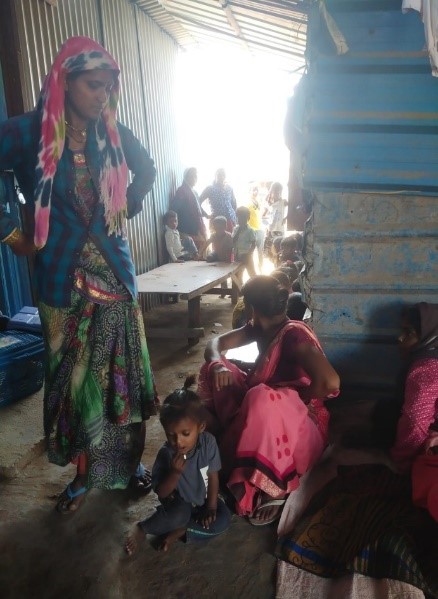An Observational Study on Menstrual Practices and Water Hygiene and Sanitation at the IIT Gandhinagar Construction Site
As we are well aware, public health relies significantly on addressing the social determinants of health (SDH), with menstrual hygiene and safe WASH practices being integral components of this approach. Unfortunately, I get to hear frequent reports of unsafe and unhygienic menstrual and WASH practices leading to the spread of diseases and illnesses within communities. Well, in my internship phase, I visited IIT Gandhinagar construction site where I witnessed altogether a unique scenario. The site is classified as a High-Risk Area and is predominantly inhabited by migrant populations from states such as Bihar, Chhattisgarh, West Bengal, and Rajasthan. I visited the site on 9th June Wednesday owing to Mamta Divas, a day which is dedicated totally to strengthen maternal and child health in Gujarat introduced by MOHFW and WCD department.

Accompanied by the health staff from the Primary Health Centre (PHC), I had the opportunity to visit the site mainly for immunisation services of under 5 children. During the visit, I had a detailed conversation with a woman from Chhattisgarh, who had taken on the responsibility of taking care of the children while their mothers were engaged in labour work at the construction site from 8 am to 5 pm. It was the month of June and in Gujarat, the Intensified Diarrhoea Control Fortnight (IDCF) campaign which aims for zero diarrhoeal deaths for under 5 children was supposed to begin from 12th June. As a support member for the campaign in the Child Health department, I was naturally curious to inquire about the WASH practices in the site area, given that diarrhoea is predominantly waterborne. During our conversation, the woman provided valuable insights into the healthy and hygienic practices being followed on the site, which I will now summarize for you.

Accompanied by the health staff from the Primary Health Centre (PHC), I had the opportunity to visit the site mainly for immunisation services of under 5 children. During the visit, I had a detailed conversation with a woman from Chhattisgarh, who had taken on the responsibility of taking care of the children while their mothers were engaged in labour work at the construction site from 8 am to 5 pm. It was the month of June and in Gujarat, the Intensified Diarrhoea Control Fortnight (IDCF) campaign which aims for zero diarrhoeal deaths for under 5 children was supposed to begin from 12th June. As a support member for the campaign in the Child Health department, I was naturally curious to inquire about the WASH practices in the site area, given that diarrhoea is predominantly waterborne. During our conversation, the woman provided valuable insights into the healthy and hygienic practices being followed on the site, which I will now summarize for you.

Additionally, the woman emphasized the need to maintain discretion in disposing of sanitary napkins, particularly to safeguard the privacy and dignity of women. Men in the site area were not to be informed or made aware of the disposal process, as per the prevailing cultural beliefs. It was considered essential to ensure that men remained unaware of any female workers going through their menstrual cycle to avoid notions of impurity associated with such natural biological processes. Furthermore, she highlighted the positive impact of regular free distribution of sanitary napkins in their colony by Government health workers. This undoubtedly played a significant role in promoting menstrual hygiene and supporting the well-being of women in the construction site area.

Regarding the hygiene and sanitation practices, despite having a single common washroom, the woman informed about the access and availability of 24* 7 running water. Additionally, the residents make use of soap for handwashing, emphasizing the importance of maintaining proper hand hygiene. Most notably, there were no instances of open defecation practices observed among any of the construction site members. To verify this, I took the initiative to speak to some women who were present there for immunisation services for their children. They confirmed that with the availability of water, soap, and a washroom, the need for open defecation is completely eliminated. One woman even shared her belief that open defecation is not only harmful for the environment but also poses risks to the health of their children. As a result, they prioritize cleanliness and sanitation in their daily routines.







